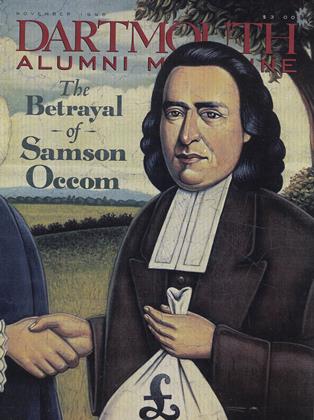One of the people most horrified by new of the July tidal wave that ripped through Papua New Guinea, drowing thousands and destroying several villages, was visiting professor of anthropology Robert Welsch, a longtime researcher of life and art in the area hardest hit. As soon as he wrapped up his summer-term courses, he departed or the long journey to see what was left of the once-thriving village of Aitipe and to help survivors, "it's not going to be easy, "he said before departure, referring to Aitipe and to help survivors. "It's not going to Among his goals was arranging for Tucker Foundation fellow Chrisanthy Menkhaus '00 to \ spend a term doing relief work at an Aitipemission.
The National Research Institute of Papua New Guinea has asked Welsch to return in January to help with one of their long-term relief efforts recording the life narratives of survivors. Getting people-to talk about their lives before and after tragedy is a technique Papuans used successfully elsehelp survivors come to terms with a deadly eruption of New Guinea's Rabaul volcano The government plans to publish the tidal-wave narratives as a memorial to the victims and a balm to survivors.
Reciprocating old favors, anthropologist Robert Welsch returned to Papua New Guinea to help tsunami survivors.
 View Full Issue
View Full Issue
More From This Issue
-
 Feature
FeatureThe Betrayal Of Samson Occom
November 1998 By Bernd Peyer -
 Feature
FeatureThe Mystery of the Tao
November 1998 By Rebecca Bailey -
 Feature
FeatureSails for the America's Cup
November 1998 By Fred Hapgood -
 Cover Story
Cover StoryThe Inauguration
November 1998 -
 Article
ArticleThe Problem with Romantics
November 1998 By Kathleen Burge '89 -
 Class Notes
Class Notes1979
November 1998 By Jeffrey D. Boylan, R. James "Wazoo" Wasz
Article
-
 Article
ArticleThayer Overseers
MAY 1972 -
 Article
ArticleGetting Produced
JUNE 1997 -
 Article
ArticleSkipper of the Chantey
NOVEMBER 1967 By CLIFF JORDAN '45 -
 Article
ArticleShooting the Colorado River
December 1949 By JOE EISAMAN '19 -
 Article
ArticleLAWRENCE E. HARVEY
January 1975 By R.B.G. -
 Article
ArticleWith the D. O. C.
April 1933 By S. B. DUNN '34

